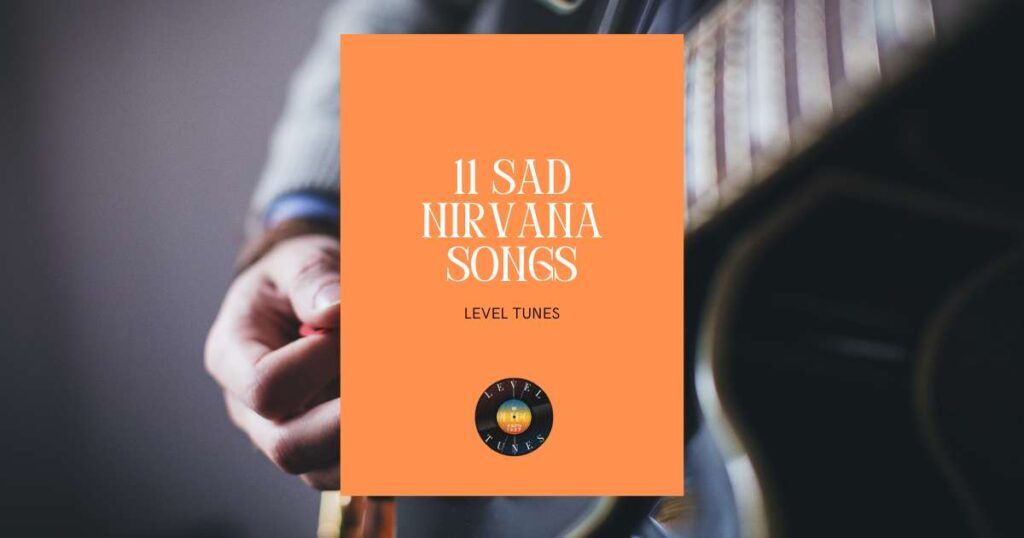11 Sad Nirvana Songs: Depths of Nirvana’s Hits
Hey everyone, TBone here from Level Tunes! As a DJ and a die-hard music fan with over 20 years of experience in the industry, I’ve had the pleasure of exploring various genres and sharing my findings with you all.
Today, I’m diving into a topic close to my heart: the 11 saddest Nirvana songs.
Nirvana has always resonated with me, blending raw emotion with groundbreaking soundscapes, and it’s a genre I deeply love.
I’ve chosen these songs because they showcase the band’s unique ability to articulate profound sadness and introspection, something that’s always struck a chord with me.
Whether you’re a long-time fan or new to their music, I hope this list helps you appreciate the depth and emotion of Nirvana’s work. Let’s explore these melancholic tracks together, and maybe find a bit of solace in their timeless sound.
Here are the sad Nirvana songs that you can check out:
List Of Sad Nirvana Songs
Sad Nirvana songs in a list format:
Something in the Way
“Something in the Way” is one of Nirvana’s most hauntingly beautiful songs, written by Kurt Cobain. It’s the final listed track on their groundbreaking album “Nevermind,” released in 1991 under DGC Records. The song features a minimalist arrangement, with Cobain’s somber vocals and acoustic guitar, accompanied by Dave Grohl’s restrained drumming and Krist Novoselic’s deep bass lines. What strikes me most about this song is its stark simplicity and the profound sense of isolation it conveys. Cobain was inspired by a period of homelessness, and you can feel the weight of that experience in every note. The song’s haunting melody and the raw emotion in Cobain’s voice make it a poignant reflection on loneliness and despair.
All Apologies
“All Apologies” showcases Nirvana’s softer, more introspective side. Featured on their 1993 album “In Utero,” released by DGC Records, it’s a song that Cobain dedicated to his wife and daughter. This track stands out for its melodic complexity and the sense of resignation in the lyrics. The combination of Cobain’s tender vocals, Grohl’s dynamic drumming, and Novoselic’s melodic bass create a deeply emotional soundscape. The song’s repetitive chorus, “All in all is all we are,” echoes a universal sentiment of imperfection and acceptance. I’ve always admired how “All Apologies” manages to be both melancholic and soothing, offering a sense of peace amidst the chaos of life.
Heart-Shaped Box
From the opening chords, “Heart-Shaped Box,” a lead single from “In Utero” (1993, DGC Records), envelops you in its intense emotional landscape. Cobain’s songwriting here is at its most visceral, painting vivid images of pain and longing. The song was said to be inspired by his tumultuous relationship with Courtney Love, but its themes of confusion and yearning are universal. Grohl’s powerful drumming and Novoselic’s bass complement Cobain’s raw, strained vocals perfectly, creating a masterpiece of emotional rock. What I find most compelling about “Heart-Shaped Box” is its ability to capture the complexity of love and desire, wrapping it in a sound that’s both aggressive and deeply sad.
Dumb
“Dumb” is one of the more subdued tracks on “In Utero,” offering a glimpse into Cobain’s struggle with fame and his quest for simplicity and happiness. The song’s gentle melody, combined with Cobain’s introspective lyrics and soft vocal delivery, creates a feeling of vulnerability and introspection. The inclusion of a cello adds a layer of melancholic beauty to the track, setting it apart from the more abrasive songs on the album. “Dumb” resonates with me for its honesty and simplicity; it’s a reminder that amidst the noise and chaos of life, there’s a longing for understanding and peace that’s universally relatable.
Polly
“Polly” takes us back to Nirvana’s breakthrough album, “Nevermind” (1991, DGC Records), with a narrative that’s as disturbing as it is captivating. The song is based on a true story of abduction, adding a layer of darkness to its acoustic simplicity. Cobain’s delivery is hauntingly matter-of-fact, which, combined with the stark, minimalist instrumentation, makes “Polly” one of Nirvana’s most chilling compositions. The song’s ability to tell such a harrowing story with such calm is a testament to Cobain’s songwriting genius. It’s this juxtaposition of serenity and terror, beauty and pain, that makes “Polly” an unforgettable piece in Nirvana’s catalog.
Pennyroyal Tea
“Pennyroyal Tea” is a standout track on “In Utero,” distinguished by its raw emotional honesty and stripped-back sound. Cobain’s lyrics delve into themes of depression and disillusionment, with the titular “pennyroyal tea” serving as a metaphor for self-treatment and possibly a reference to abortifacients. The song’s simple, yet powerful arrangement allows Cobain’s voice to take center stage, conveying a sense of desperation and weariness that’s palpable. What I admire about “Pennyroyal Tea” is its unflinching look at mental health struggles, presented through Cobain’s uniquely poignant perspective. This song serves as a stark reminder of the singer’s inner turmoil, making it a powerful and moving piece.
About a Girl
“About a Girl” is one of the earliest showcases of Cobain’s knack for blending melodic pop sensibilities with punk rock’s raw edge. Featured on
Nirvana’s debut album, “Bleach,” released in 1989 under the Sub Pop label, “About a Girl” stands out for its clear departure from the heavier grunge sound that dominates the rest of the album. This song, inspired by Cobain’s relationship at the time, offers a more melodic and accessible sound, highlighting his ability to write catchy yet emotionally resonant songs. The contrast between the gritty production of “Bleach” and the song’s poppier vibe showcases Cobain’s diverse musical influences and songwriting skills. I’m particularly drawn to “About a Girl” for its straightforwardness and purity, a refreshing glimpse into the complexities of love and understanding. It’s a reminder of the band’s range and Cobain’s foresight into the evolving sound that would later define Nirvana’s legacy.
The Man Who Sold the World
Nirvana’s rendition of “The Man Who Sold the World,” a David Bowie classic, appeared on their “MTV Unplugged in New York” album, released in 1994 after Cobain’s death, under DGC Records. This live performance captures a moment of vulnerability and introspection, with Cobain’s voice conveying a haunting sense of isolation and existential inquiry. The acoustic setting of the MTV Unplugged session provided a stark canvas for Nirvana’s raw emotionality, and “The Man Who Sold the World” stands as a poignant highlight. What makes this performance so special is not just the song’s lyrical depth but also how Nirvana made it entirely their own, transforming Bowie’s original into a somber, introspective ballad that resonates with the band’s thematic concerns of alienation and search for identity. It’s a testament to their ability to connect deeply with songs beyond their own discography, making “The Man Who Sold the World” a memorable and moving piece.
Where Did You Sleep Last Night
Another gem from the “MTV Unplugged in New York” album, “Where Did You Sleep Last Night,” is a traditional American folk song that Cobain infused with a palpable sense of pain and betrayal. His vocal performance, especially in the song’s climax, is one of his most powerful, breaking with emotion and leaving listeners with a haunting sense of loss and longing. The acoustic arrangement allows each note to resonate, making Cobain’s emotional delivery the focal point of the song. This track is a favorite of mine for its raw intensity and the way it showcases Cobain’s ability to convey deep emotional truths through his interpretations of traditional music. It’s a stark reminder of his exceptional talent as a vocalist and interpreter, making “Where Did You Sleep Last Night” a profoundly moving conclusion to the unplugged set.
Rape Me
“Rape Me,” from the album “In Utero” (1993, DGC Records), is a controversial and powerful statement against sexual assault. Cobain’s direct and confrontational lyrics, paired with the band’s aggressive musical backing, create a stark and challenging listen. This song exemplifies Nirvana’s refusal to shy away from difficult topics, using their platform to highlight societal issues. What stands out to me is how “Rape Me” manages to be both a protest song and a deeply personal expression of defiance and vulnerability. It’s a powerful example of how music can be used to challenge and provoke, making it a significant and impactful track in Nirvana’s catalog.
You Know You’re Right
“You Know You’re Right” was the last song recorded by Nirvana before Cobain’s death, released posthumously on the “Nirvana” compilation album in 2002 by DGC Records. This track is a haunting reminder of what could have been, showcasing Cobain’s distinctive vocal and lyrical style at its most raw and emotional. The song’s explosive dynamics, from the subdued verses to the anguished chorus, reflect the inner turmoil and frustration that Cobain was known for. What draws me to “You Know You’re Right” is its intensity and the sense of finality it carries, offering a poignant closure to the band’s career. It’s a powerful testament to Cobain’s enduring legacy as a songwriter and artist, making it an essential part of Nirvana’s emotional discography.
Fun Facts: Sad Nirvana Songs
Something in the Way
“Something in the Way” was recorded in a unique manner. Kurt Cobain struggled to capture the song’s essence with the full band during the “Nevermind” recording sessions. Eventually, producer Butch Vig recorded Cobain playing the song alone on his acoustic guitar and singing, with the studio lights turned down low to create the right atmosphere. The rest of the band’s contributions were added later, capturing the song’s haunting vibe perfectly. This recording method was emblematic of Cobain’s sensitivity and the intimate nature of the song.
All Apologies
“All Apologies” was dedicated by Kurt Cobain to his wife, Courtney Love, and their daughter, Frances Bean Cobain. Cobain often stated in interviews that the song reflected his desire for a peaceful life and his love for his family. Interestingly, the song gained a new layer of interpretation after Cobain’s death, with fans and critics alike seeing it as a farewell note. The version recorded for MTV’s Unplugged is particularly celebrated for its raw and emotional delivery, offering a different perspective on the song’s meaning.
Heart-Shaped Box
“Heart-Shaped Box” was inspired by a surreal dream Cobain had, involving children with cancer. The song’s lyrics are filled with imagery that reflects Cobain’s fascination with medical anomalies, human anatomy, and mortality. The music video, directed by Anton Corbijn, features striking visuals that reference Cobain’s dream and other personal symbols, making it one of the band’s most memorable videos. The title “Heart-Shaped Box” itself allegedly refers to a gift Cobain received from Courtney Love, adding a personal touch to the song’s origins.
Polly
“Polly” was inspired by a horrifying true event: the abduction and rape of a 14-year-old girl in 1987 after a punk rock show. Cobain wrote the song from the perspective of the perpetrator, a songwriting choice that was both controversial and impactful. It highlighted his ability to confront dark and serious topics within his music. The stark, acoustic arrangement of “Polly” contrasts sharply with its disturbing subject matter, making it one of Nirvana’s most chilling and effective songs.
Pennyroyal Tea
“Pennyroyal Tea” refers to a herbal remedy that was traditionally used as an abortifacient. Cobain’s lyrics speak to his fascination with medical themes, but they also metaphorically address his feelings of stomach pain and personal anguish. The single for “Pennyroyal Tea” was recalled shortly after Cobain’s death, making original copies highly sought after by collectors. The unplugged version of the song is celebrated for its raw emotional intensity and simplicity, showcasing Cobain’s poignant vocal delivery.
You Know You’re Right
“You Know You’re Right” was the last song Nirvana recorded before Cobain’s death, and it wasn’t released until years later, due to legal battles between Cobain’s widow, Courtney Love, and the remaining band members. The song’s eventual release in 2002 created a wave of nostalgia and speculation about the future direction of Nirvana’s music had Cobain lived. Its lyrics are interpreted as reflecting Cobain’s personal struggles, making it a haunting addition to the band’s legacy.
Exploring these tracks reveals the depth of Nirvana’s music, showcasing the band’s unique ability to blend raw emotion with unforgettable melodies. As we dive into the stories behind these songs, we’re reminded of their timeless impact and the legacy that continues to inspire.
Thanks for reading.
TBone




